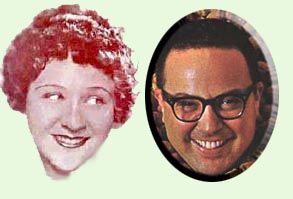I was saddened that Marty Ingels (Marty Ingerman, March 9, 1936 – October 21, 2015) died of a massive stroke…and that obits pretty much went with "husband of Shirley Jones" as his fame. He was a pretty unique comedian, even if his style, and his demons, got the better of him.
Yes, Marty was a "piece of work," but he did what he could with some serious problems. In the Shirley-Marty autobiography he mentioned some of the mental frustrations he had to deal with; everything from breakdowns that left him lying flat on his back and unable to move, to phobias that made life difficult (such as his fear of flying). He once suffered an anxiety attack while doing a stand-up routine — during an appearance on "The Tonight Show."
I didn't have that much contact with the guy. I was involved in one project with him, and years later, another which included a series of phone calls. On the latter, which involved a third party, the third party called ME begging, "Please talk to Marty and tell him to stop driving me crazy!" Yeah, Marty could be a bit "noodgy," or just "spooky-serious" (which always seems frightening to people who expect a comic to always be cheerful and cracking jokes). The problem was that these traits couldn't be excused with "ah, but he's a genius." He never got much of a chance to show genius in comedy, not even at the level of the notoriously nutty Red Skelton.
Marty was sort of a Jewish Red Skelton. He was tall, childlike and had a crooked grin and an amusingly raspy delivery style. He played good natured fools who meant well but were bumblingly aggressive and lacked some social skills. Playing Arch Fenster, a "man child" opposite the worried Harry Dickens (John Astin) he won some fans when he starred in the intelligent slapstick sitcom called "I'm Dickens He's Fenster." It was recently resurrected on DVD, complete with a booklet describing the show's pedigree (great writing, directing, co-stars) and how it was somehow a failure that maybe could've blossomed into a hit if given another season.
Marty did manage to tour in stage productions of well-known comedies, take some good supporting roles on TV and was in a variety of pretty dated 60's film comedies, and then turn to managing when he became older. He met Shirley Jones at a party in 1974 and they were wed in 1977. Like most comics whose trade is naive bumbling and goofy rudeness, his schtick just didn't work after middle-age. At that point, whether you're a Tommy Smothers or a Bill Cosby, you better find a new way of presenting yourself or you're going to be a nostalgia act at best. And Marty didn't have much for nostalgists beyond his "Arch Fenster" character. So he ended up Mr. Shirley Jones, and also a bizarre guy who was prone to litigation and fighting with his clients.
Probably his most notorious legal case involved his client June Allyson. In a dubious bit of brand-marketing, which made her the butt of many a stand-up comic's jokes, Marty signed June to do ads for Depend, an adult diaper. Later, Marty was pissed; he claimed June owed him money. He allegedly called her all day about it…making 138 calls. Apparently the phone company verified this, and ultimately Marty lost the case. It would not be the last time his rush to legal judgment ended with him paying court costs and suffering defeat.
As Variety's obit gently observed, "In his later years, Ingels was relentless in promoting various TV, film and stage projects he sought to get off the ground as a producer. He was known to make frequent calls to Variety editors and reporters with story pitches. A conversation with Ingels could be time-consuming, but it was never dull."
He never really changed. Even when he became another D-lister on Facebook, he was prone to driving everyone nuts. He'd suddenly go off on some conservative rage about politics and morality, and amid the "good for you, Marty" and "that's how I feel, too," he'd get a lot of shrugs of chagrin. Sometimes he'd apologize for going off, sometimes not. I am not sure if his Facebook account was "deactivated" when he died, or months earlier. He might well have scuttled it in anger and frustration over some real or imagined insult. The NY Times obit wittily remarked, that Marty "was by all accounts highly voluble, genially combustible, energetically litigious and unmistakably larger than life." Indeed.
Yeah, he was one of those guys that you might think twice about dialing up. He could easily find some reason to seize on a particular remark and become offended, or just take it in a wacky direction. But he was, though not given enough chances to show it, a genuine, authentic and charismatic character. Shirley Jones would tell baffled fans and friends and reporters that she too could find Marty a bit difficult and/or embarrassing. His death was announced via a statement from Jones, which ended with: "“He often drove me crazy, but there’s not a day I won’t miss him and love him to my core.”
So we leave it at that. Sometimes, especially with comedians, whom we are used to seeing as zany, smiling, good-natured and goofy, the other side seems a bit appalling and dark. But on a good day, he was very good.
And below? Two versions of the "I'm Dickens He's Fenster" theme song. The show's pedigree included having Irving Szathmary write the theme song. Who better? Irving (brother of Bill Dana, aka Jose Jimenez, and once known as Bill Szathmary) began his career helping to score Raymond Scott's zany instrumentals. He later recorded an eccentric ten-inch album (as Irving Zathmary) called "Moods for Moderns." It was a Leroy Anderson-type deal; he offered cartoonish versions of such dopey classics as "Sailor's Hornpipe," "Irish Washerwoman," and "Pitter Patter Polka." The kiddie classic "Hickory Dickory Doc" was "swung" into the re-titled ""Dick-Dockery." Irving would later achieve immortality writing the theme for "Get Smart." Here, his intent was very much to establish the link between the modern Dickens and Fenster and past masters at slapstick foibles, Laurel and Hardy.
You get two versions of the Dickens and Fenster march…the original TV soundtrack, and Nelson Riddle's expanded version. Here's to Irving Szathmary, whom Jose Jimenez would have noted, was a very talented Jungarian Hew.
Original TV THEME Just as it was heard on the sitcom soundtrack
Dickens and Fenster in STEREO Nelson Riddle and his Orchestra.













